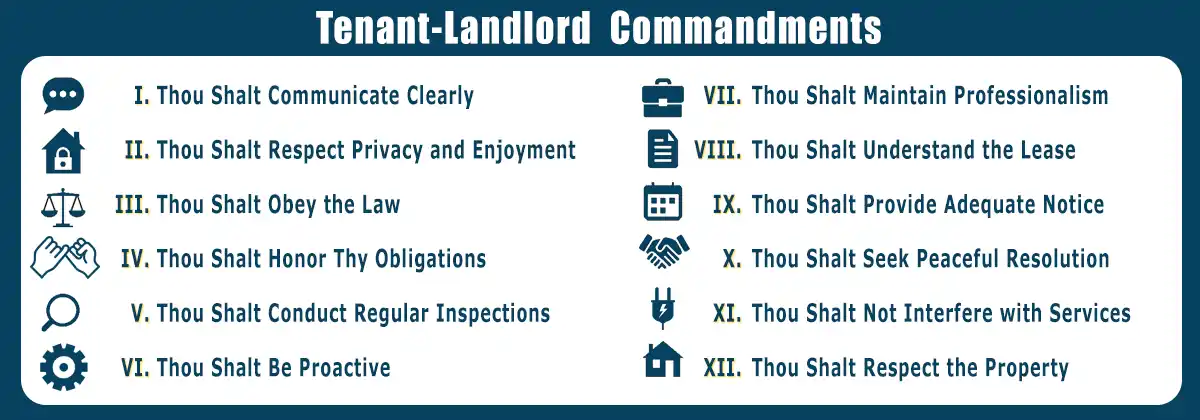The 12 Commandments of a Successful Tenant-Landlord Relationship

This infographic was developed with the assistance of ChatGPT to outline key principles of successful tenant-landlord relationships.
A harmonious tenant-landlord relationship is crucial for a peaceful living environment and successful rental agreement. In Ontario, adhering to a set of fundamental principles can greatly enhance this dynamic. Inspired by the idea of "Ten Commandments," here are twelve essential guidelines tailored for tenants and landlords. Following these principles not only simplifies interactions but also fosters a cooperative atmosphere that benefits both parties. By respecting each other’s roles and responsibilities, both tenants and landlords can achieve a win-win relationship that ensures long-term satisfaction and success.
1. Thou Shalt Communicate Clearly
Effective communication is the cornerstone of any strong relationship, including that between tenant and landlord. Keep all interactions open, documented, and professional. This ensures both parties are on the same page and minimizes misunderstandings.
2. Thou Shalt Respect Privacy and Enjoyment
Tenants and landlords must respect each other's privacy and peaceful enjoyment of the property. Landlords should avoid unnecessary disturbances, and tenants should behave in a manner that respects the neighborhood, such as observing quiet hours.
3. Thou Shalt Obey the Law
Both parties must understand and comply with the Residential Tenancies Act, which governs rental relationships in Ontario. Knowledge of the law protects rights and clarifies duties, preventing legal disputes from arising due to ignorance.
4. Thou Shalt Honor Thy Obligations
Tenants shall pay rent on time, and landlords shall maintain the property in good repair. Adhering to these obligations keeps the relationship positive and the property habitable.
5. Thou Shalt Conduct Regular Inspections
Landlords should perform and document inspections respectfully, with proper notice, and tenants should cooperate by providing access as required by law.
6. Thou Shalt Be Proactive
Address potential issues before they escalate into problems. Whether it’s a repair need or a concern about lease terms, addressing matters early on can save time, money, and stress for both tenants and landlords.
7. Thou Shalt Maintain Professionalism
Maintaining a professional demeanor helps in treating each other with respect and courtesy. This commandment is essential in fostering a positive and long-lasting tenant-landlord relationship.
8. Thou Shalt Understand the Lease
Both parties should thoroughly understand and agree to all terms in the rental agreement. This includes rules about pets, subletting, and other key aspects that could lead to disputes if not clearly understood.
9. Thou Shalt Provide Adequate Notice
Both landlords and tenants should give proper notice for entry, repairs, lease terminations, and renewals as per the Act, ensuring transparency and respect for each other’s time and privacy.
10. Thou Shalt Seek Peaceful Resolution
If disputes arise, seek peaceful resolutions before resorting to legal action. Mediation services or the Landlord and Tenant Board can provide guidance and solutions without the need for a contentious battle in court.
11. Thou Shalt Not Interfere with Services
Landlords must not withhold or interfere with the provision of vital services, care services, or meals, and tenants must ensure their actions do not disrupt these services either.
12. Thou Shalt Respect the Property
Tenants should maintain cleanliness and report damages promptly, and landlords should respect tenant's personal space and belongings.
In conclusion, by respecting each other's rights and responsibilities, tenants and landlords in Ontario can create a positive atmosphere that benefits everyone involved. Following these twelve commandments will help ensure that both parties feel respected, valued, and legally protected throughout their rental agreement. Embracing these guidelines leads to a win-win situation where both parties enjoy a harmonious living and working relationship, paving the way for mutual respect and understanding.
Don’t hesitate to assert your rights and seek professional legal assistance when necessary. For expert help with tenant-landlord disputes, contact AA Paralegal Services today. Schedule a consultation by completing the consultation form or calling 905-873-0002.
ATTENDING COURTS FOR: Georgetown, Halton Hills, Milton, Guelph, Oakville, Burlington, Mississauga, Brampton, Orangeville, Caledon.
Small Claims Court Paralegal and Commissioner of Oaths